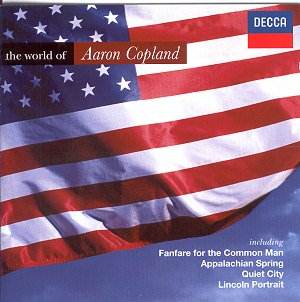Aaron Copland was born in Brooklyn, the son of émigré
Russian parents. During the course of his long career he was tireless
in his efforts to champion the cause of American music; and his own
substantial output reflects his eclectic tastes, for his compositions
range through all the major forms. His achievement as a musician spread
beyond his compositions, moreover, to other activities such as performing,
lecturing and writing.
Decca's 'World of' series, which first appeared nearly
fifty years ago and has recently been resurrected, is intended to give
the collector an introduction to the art of a particular composer. In
that case, one of the issues on the agenda must be the extent to which
the chosen repertoire really is a representative survey. In this sense
the Copland collection scores seven or eight out of ten. While some
of the finest and most idiomatic works are here, including some of the
best known, what is missing is the tougher aspect of a wide ranging
personality. It is easy to see why an acerbic piece like the Piano
Variations (1930) might not fit easily in this process, but it presence
at the expense of Bernstein virtuoso transcription of El Salón
México would have strengthened to recommendation of this
reviewer, at least.
After that cavil at what is missing, let us rejoice
instead in what we have. The Decca catalogue has accumulated some fine
performances of Copland in some stunning recordings. During his tenure
as principal conductor of the Los Angeles Philharmonic, Zubin Mehta
created a reputation for orchestral splendour and virtuosity that was
second to none. So it proves in their 1975 recording of the famous Fanfare
for the Common Man, which makes a stirring impression, with appropriately
abundant rhetorical gesturing. Rhetoric of a somewhat different kind
is found in the Lincoln Portrait, a piece which perhaps works
better in a live performance which can develop its own tensions of time
and place. In the context of a recording the experience feels flat and
mannered. Not that there is anything much wrong with this recording
itself, which has an idiomatic speaker in Gregory Peck, captured in
well balanced sound with the orchestra.
Quiet City is one of Copland's best pieces,
beautifully constructed and atmospheric. Marriner and the Academy bring
their considerable talents to the fore, in what is as beautiful a performance
as the work can have received. It is followed in the sequence by that
most celebrated of ballet scores, Appalachian String, in its
revised version of orchestra rather than the original chamber version
for thirteen instruments. Since each is equally valid, there is no problem
with that decision, nor with the performance by Antal Dorati and the
Detroit Orchestra. The slower music is wonderfully atmospheric, while
there is a genuinely balletic quality to the folk rhythms which sometimes
drive the music forward. The standard of the playing and the recorded
sound are top class too.
The quality of the less celebrated American orchestras
is also experienced in the splendidly vital performance by the Baltimore
Symphony and David Zinman, of the Danzón Cubano. The Latin
American aspect of Copland's creative output is important, and this
a certainly a spirited example. Bernstein's stunning piano transcription
of El salón México offers further evidence of this
style, and is brilliantly played by Peter Jablonski.
For many the highlight of the collection will be the
singing of the great Marilyn Horne, in the orchestral versions of five
songs from the collection of Old American Songs. She brings the
full range of personality to her performances, from the directness of
Simple Gifts to the sentimentality of Long Time Ago, while
her rendition of I Bought Me a Cat is simply a tour-de-force.
Terry Barfoot

